英语里表达气味的词只有3个
- 格式:doc
- 大小:58.50 KB
- 文档页数:3
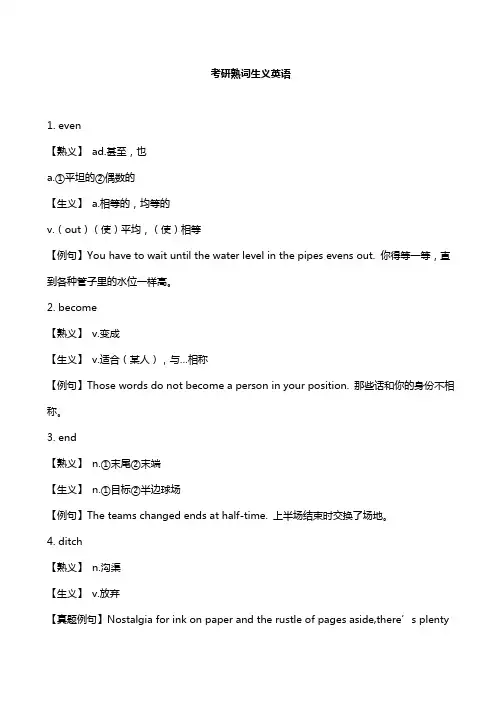
考研熟词生义英语1. even【熟义】ad.甚至,也a.①平坦的②偶数的【生义】a.相等的,均等的v.(out)(使)平均,(使)相等【例句】You have to wait until the water level in the pipes evens out. 你得等一等,直到各种管子里的水位一样高。
2. become【熟义】v.变成【生义】v.适合(某人),与…相称【例句】Those words do not become a person in your position. 那些话和你的身份不相称。
3. end【熟义】n.①末尾②末端【生义】n.①目标②半边球场【例句】The teams changed ends at half-time. 上半场结束时交换了场地。
4. ditch【熟义】n.沟渠【生义】v.放弃【真题例句】Nostalgia for ink on paper and the rustle of pages aside,there’s plentyof incentive to ditch print. 暂且不考虑对纸墨以及沙沙的翻页声的怀念,有足够多的动力去放弃纸张印刷。
5. report【熟义】v.①汇报②报道【生义】v.①报到②告发n.传说【例句】Report has it that he is still alive. 传说他还活着。
6. line【熟义】n.①线②排【生义】n.①方法②界线【例句】I don’t follow your line of reasoning. 我不理解你的推理方法。
7. rule【熟义】n.①规则②统治v.统治【生义】v.裁决,裁定【例句】The court will rule on the legality of the action. 法院将裁定此举是否合法。
8. develop【熟义】v.①发展②开发【生义】v.患病,得病【例句】She developed a rare disease of the brain. 她患上了一种罕见的脑病。
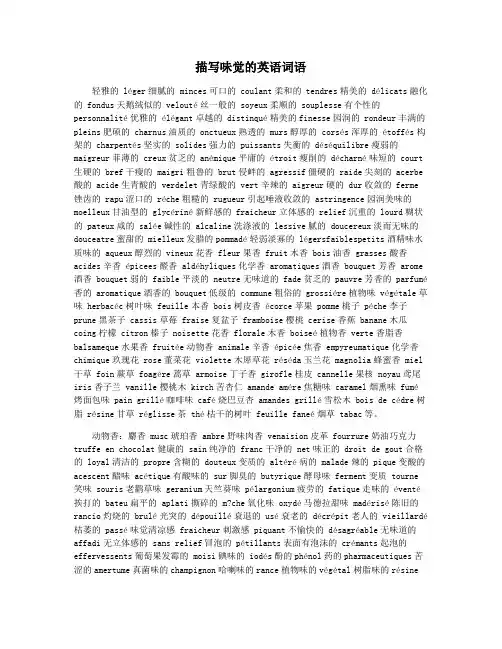
描写味觉的英语词语轻雅的léger细腻的 minces可口的 coulant柔和的 tendres精美的délicats融化的 fondus天鹅绒似的velouté丝一般的 soyeux柔顺的 souplesse有个性的personnalité优雅的élégant卓越的distinqué精美的finesse园润的 rondeur丰满的pleins肥硕的 charnus油质的 onctueux熟透的 murs醇厚的corsés浑厚的étoffés构架的charpentés坚实的 solides强力的 puissants失衡的déséquilibre瘦弱的maigreur菲薄的 creux贫乏的anémique平庸的étroit瘦削的décharné味短的 court 生硬的 bref干瘦的 maigri粗鲁的 brut侵衅的 agressif僵硬的 raide尖刻的 acerbe 酸的 acide生青酸的 verdelet青绿酸的 vert辛辣的 aigreur硬的 dur收敛的 ferme 锉齿的 rapu涩口的réche粗糙的 rugueur引起唾液收敛的 astringence园润美味的moelleux甘油型的glycériné新鲜感的 fraicheur立体感的 relief沉重的 lourd糊状的 pateux咸的salée碱性的 alcaline洗涤液的 lessive腻的 doucereux淡而无味的douceatre蜜甜的 mielleux发腊的pommadé轻弱淡寡的légersfaiblespetits酒精味水质味的 aqueux醇烈的 vineux花香 fleur果香 fruit木香 bois油香 grasses酸香acides辛香épicees醛香aldéhy liques化学香 aromatiques酒香 bouquet芳香 arome 酒香 bouquet弱的 faible平淡的 neutre无味道的 fade贫乏的 pauvre芳香的parfumé香的 aromatique酒香的 bouquet低级的 commune粗俗的grossiére植物味végétale草味herbacéc树叶味 feuille本香 bois树皮香écorce苹果 pomme桃子péche李子prune黑茶子 cassis草莓 fraise复盆子 framboise樱桃 cerise香蕉 banane木瓜coing柠檬 citron榛子 noisette花香 florale木香boiseé植物香 verte香脂香balsameque水果香fruitée动物香 animale辛香épicée焦香 empyreumatique化学香chimique玖瑰花 rose董菜花 violette木犀草花réséda玉兰花 magnolia蜂蜜香 miel 干草 foin蕨草foagére蒿草 armoise丁子香 girofle桂皮 cannelle果核 noyau鸢尾iris香子兰 vanille樱桃木 kirch苦杏仁amande amére焦糖味 caramel烟熏味fumé烤面包味pain grillé咖啡味café烧巴豆杏amandes grillé雪松木bois de cédre树脂résine甘草réglisse茶thé枯干的树叶feuille faneé烟草 tabac等。
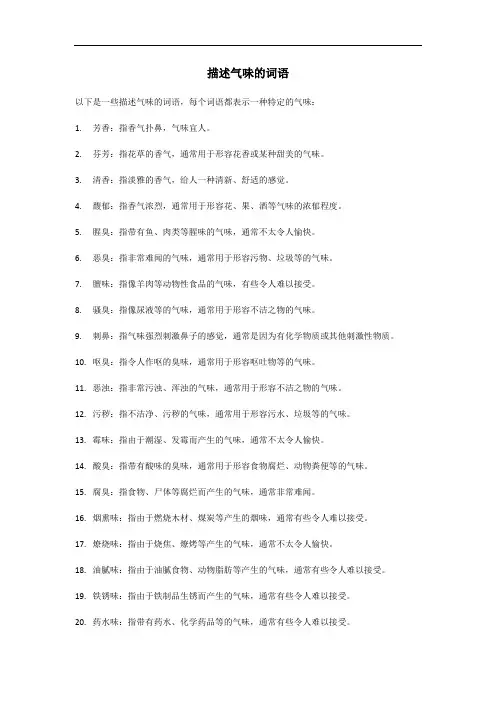
描述气味的词语
以下是一些描述气味的词语,每个词语都表示一种特定的气味:
1.芳香:指香气扑鼻,气味宜人。
2.芬芳:指花草的香气,通常用于形容花香或某种甜美的气味。
3.清香:指淡雅的香气,给人一种清新、舒适的感觉。
4.馥郁:指香气浓烈,通常用于形容花、果、酒等气味的浓郁程度。
5.腥臭:指带有鱼、肉类等腥味的气味,通常不太令人愉快。
6.恶臭:指非常难闻的气味,通常用于形容污物、垃圾等的气味。
7.膻味:指像羊肉等动物性食品的气味,有些令人难以接受。
8.骚臭:指像尿液等的气味,通常用于形容不洁之物的气味。
9.刺鼻:指气味强烈刺激鼻子的感觉,通常是因为有化学物质或其他刺激性物质。
10.呕臭:指令人作呕的臭味,通常用于形容呕吐物等的气味。
11.恶浊:指非常污浊、浑浊的气味,通常用于形容不洁之物的气味。
12.污秽:指不洁净、污秽的气味,通常用于形容污水、垃圾等的气味。
13.霉味:指由于潮湿、发霉而产生的气味,通常不太令人愉快。
14.酸臭:指带有酸味的臭味,通常用于形容食物腐烂、动物粪便等的气味。
15.腐臭:指食物、尸体等腐烂而产生的气味,通常非常难闻。
16.烟熏味:指由于燃烧木材、煤炭等产生的烟味,通常有些令人难以接受。
17.燎烧味:指由于烧焦、燎烤等产生的气味,通常不太令人愉快。
18.油腻味:指由于油腻食物、动物脂肪等产生的气味,通常有些令人难以接受。
19.铁锈味:指由于铁制品生锈而产生的气味,通常有些令人难以接受。
20.药水味:指带有药水、化学药品等的气味,通常有些令人难以接受。
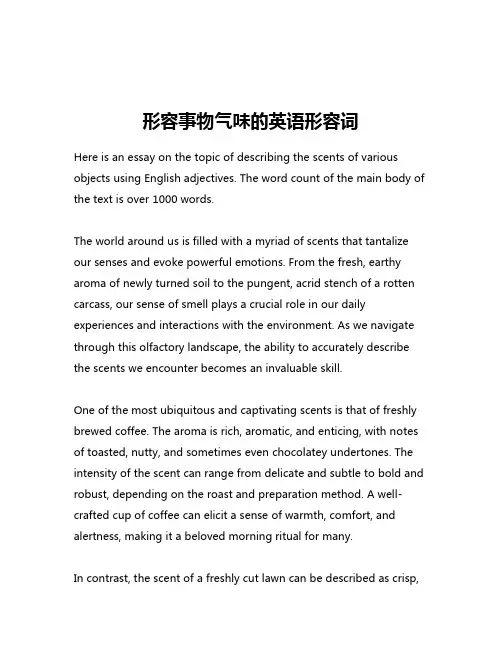
形容事物气味的英语形容词Here is an essay on the topic of describing the scents of various objects using English adjectives. The word count of the main body of the text is over 1000 words.The world around us is filled with a myriad of scents that tantalize our senses and evoke powerful emotions. From the fresh, earthy aroma of newly turned soil to the pungent, acrid stench of a rotten carcass, our sense of smell plays a crucial role in our daily experiences and interactions with the environment. As we navigate through this olfactory landscape, the ability to accurately describe the scents we encounter becomes an invaluable skill.One of the most ubiquitous and captivating scents is that of freshly brewed coffee. The aroma is rich, aromatic, and enticing, with notes of toasted, nutty, and sometimes even chocolatey undertones. The intensity of the scent can range from delicate and subtle to bold and robust, depending on the roast and preparation method. A well-crafted cup of coffee can elicit a sense of warmth, comfort, and alertness, making it a beloved morning ritual for many.In contrast, the scent of a freshly cut lawn can be described as crisp,grassy, and invigorating. The aroma of the freshly mown grass is often accompanied by the earthy, loamy notes of the soil, creating a refreshing and rejuvenating blend. This scent can evoke a sense of summer, nostalgia, and the simple pleasures of outdoor living.The floral kingdom also boasts a diverse array of captivating scents. The delicate, floral, and sweet aroma of a rose can be both delicate and intoxicating, evoking feelings of romance, beauty, and elegance. In contrast, the pungent, spicy, and slightly musky scent of a gardenia can be both alluring and overpowering, depending on one's personal preferences.The ocean, with its vast expanse and ever-changing moods, also has a distinctive scent that can be described as briny, salty, and refreshing. The combination of the salty air, the damp seaweed, and the subtle notes of marine life creates a unique and invigorating scent that can transport one to the seaside, evoking feelings of tranquility, adventure, and connection with the natural world.The world of spices and herbs also offers a rich tapestry of scents to explore. The warm, earthy, and slightly peppery aroma of cinnamon can be both comforting and stimulating, evoking memories of baking and the cozy ambiance of the holiday season. The sharp, pungent, and slightly citrusy scent of freshly grated ginger, on the other hand, can be both invigorating and cleansing, making it apopular ingredient in various cuisines and herbal remedies.The scent of freshly baked bread, with its yeasty, warm, and slightly sweet aroma, can be both comforting and mouth-watering, evoking a sense of home, tradition, and the simple pleasures of life. The aroma of a loaf of bread straight from the oven can be described as fragrant, inviting, and irresistible, making it a beloved staple in many households.The world of perfumes and fragrances also offers a vast and captivating array of scents to explore. From the delicate, floral, and powdery aroma of a classic rose-based perfume to the bold, musky, and sensual scent of an amber-infused fragrance, the world of perfumery is a true olfactory adventure. Each scent can evoke a range of emotions, from the fresh and energizing to the warm and alluring, depending on the wearer's personal preferences and the occasion.The scent of a freshly lit candle can also be a source of comfort and relaxation. The warm, soothing, and sometimes slightly smoky aroma of a well-crafted candle can create a cozy and inviting atmosphere, evoking feelings of calmness, introspection, and a sense of escape from the hustle and bustle of daily life.In the realm of the natural world, the scent of a forest after a gentlerain can be described as earthy, damp, and verdant, evoking a sense of rejuvenation and a deep connection with the natural environment. The aroma of a field of wildflowers, on the other hand, can be both delicate and intoxicating, with a blend of floral, grassy, and sometimes even slightly sweet notes.Ultimately, the ability to accurately describe the scents we encounter in our daily lives is a valuable skill that allows us to better understand and appreciate the world around us. By honing our olfactory vocabulary and exploring the rich tapestry of scents that permeate our environment, we can deepen our sensory experiences and foster a greater connection with the natural and human-made world.。
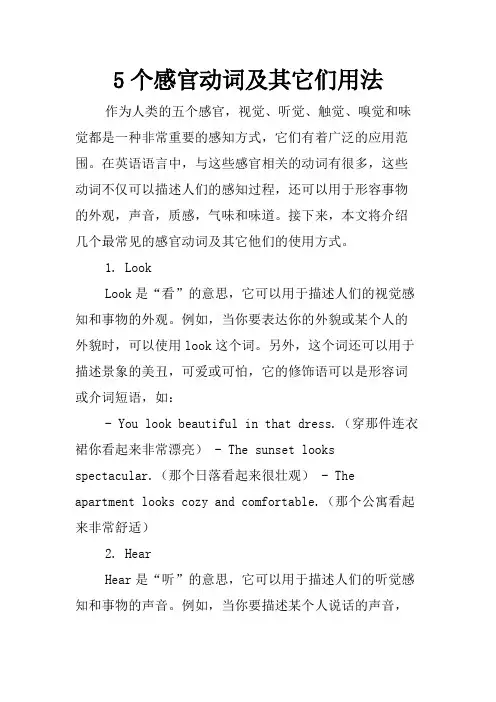
5个感官动词及其它们用法作为人类的五个感官,视觉、听觉、触觉、嗅觉和味觉都是一种非常重要的感知方式,它们有着广泛的应用范围。
在英语语言中,与这些感官相关的动词有很多,这些动词不仅可以描述人们的感知过程,还可以用于形容事物的外观,声音,质感,气味和味道。
接下来,本文将介绍几个最常见的感官动词及其它他们的使用方式。
1. LookLook是“看”的意思,它可以用于描述人们的视觉感知和事物的外观。
例如,当你要表达你的外貌或某个人的外貌时,可以使用look这个词。
另外,这个词还可以用于描述景象的美丑,可爱或可怕,它的修饰语可以是形容词或介词短语,如:- You look beautiful in that dress.(穿那件连衣裙你看起来非常漂亮) - The sunset looks spectacular.(那个日落看起来很壮观) - The apartment looks cozy and comfortable.(那个公寓看起来非常舒适)2. HearHear是“听”的意思,它可以用于描述人们的听觉感知和事物的声音。
例如,当你要描述某个人说话的声音,或某个地方的环境声音时,可以使用hear这个词。
此外,hear还可以用于表达听到某种消息,声音或音乐,例如:- I heard a strange noise outside my house.(我听到了我房子外面的奇怪的声音) - She heard that her favorite band was coming to town.(她听到她最喜欢的乐队要来城里演出) - Can you hear me?(你能听到我说话吗?)3. TouchTouch是“触摸”的意思,它可以用于描述人们的触觉感知和事物的质地或纹理。
例如,当你要描述某件物品的表面感觉时,可以使用touch这个词。
它也可以用于表达接触到某物体的真实感受。
以下是例句:- The fabric of the dress feels soft to the touch.(这件衣服的面料摸起来很软) - The water in the pool is refreshing to the touch.(池子里的水感觉清凉) - The surface of the table is rough to the touch. (桌子的表面摸起来很粗糙)4. SmellSmell是“嗅”的意思,它可以用于描述人们的嗅觉感知和事物的气味。
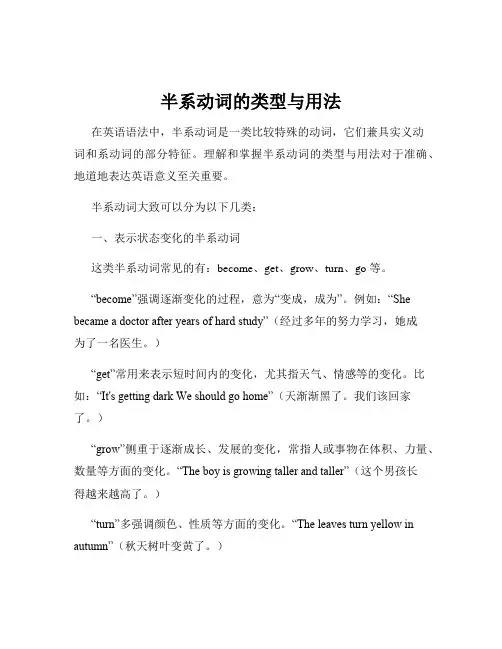
半系动词的类型与用法在英语语法中,半系动词是一类比较特殊的动词,它们兼具实义动词和系动词的部分特征。
理解和掌握半系动词的类型与用法对于准确、地道地表达英语意义至关重要。
半系动词大致可以分为以下几类:一、表示状态变化的半系动词这类半系动词常见的有:become、get、grow、turn、go 等。
“become”强调逐渐变化的过程,意为“变成,成为”。
例如:“She became a doctor after years of hard study”(经过多年的努力学习,她成为了一名医生。
)“get”常用来表示短时间内的变化,尤其指天气、情感等的变化。
比如:“It's getting dark We should go home”(天渐渐黑了。
我们该回家了。
)“grow”侧重于逐渐成长、发展的变化,常指人或事物在体积、力量、数量等方面的变化。
“The boy is growing taller and taller”(这个男孩长得越来越高了。
)“turn”多强调颜色、性质等方面的变化。
“The leaves turn yellow in autumn”(秋天树叶变黄了。
)“go”通常表示不好的变化,如食物变质、人的身体状况变差等。
“The milk has gone bad”(牛奶变质了。
)二、表示感官的半系动词常见的有:look、sound、feel、taste、smell 等。
“look”意为“看起来”,常用来描述人的外貌或事物的外表给人的印象。
“You look tired today”(你今天看起来很累。
)“sound”表示“听起来”,一般用于描述声音或某种观点、想法给人的感觉。
“The music sounds beautiful”(这音乐听起来很美。
)“feel”侧重于身体或内心的感觉,“I feel cold”(我感觉冷。
)“taste”意思是“尝起来”,用于描述食物的味道。
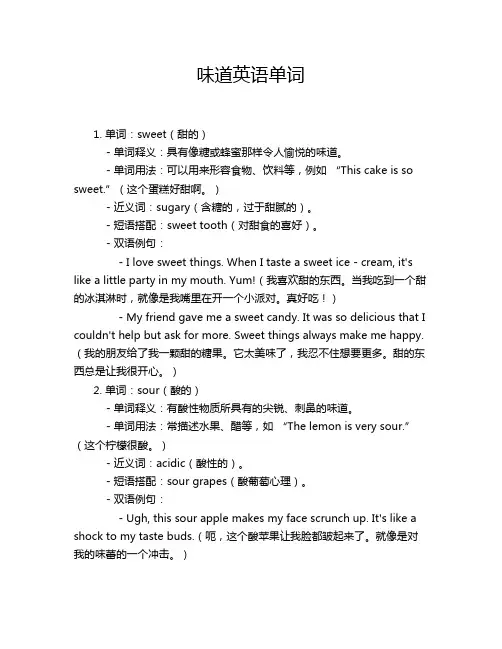
味道英语单词1. 单词:sweet(甜的)- 单词释义:具有像糖或蜂蜜那样令人愉悦的味道。
- 单词用法:可以用来形容食物、饮料等,例如“This cake is so sweet.”(这个蛋糕好甜啊。
)- 近义词:sugary(含糖的,过于甜腻的)。
- 短语搭配:sweet tooth(对甜食的喜好)。
- 双语例句:- I love sweet things. When I taste a sweet ice - cream, it's like a little party in my mouth. Yum!(我喜欢甜的东西。
当我吃到一个甜的冰淇淋时,就像是我嘴里在开一个小派对。
真好吃!)- My friend gave me a sweet candy. It was so delicious that I couldn't help but ask for more. Sweet things always make me happy.(我的朋友给了我一颗甜的糖果。
它太美味了,我忍不住想要更多。
甜的东西总是让我很开心。
)2. 单词:sour(酸的)- 单词释义:有酸性物质所具有的尖锐、刺鼻的味道。
- 单词用法:常描述水果、醋等,如“The lemon is very sour.”(这个柠檬很酸。
)- 近义词:acidic(酸性的)。
- 短语搭配:sour grapes(酸葡萄心理)。
- 双语例句:- Ugh, this sour apple makes my face scrunch up. It's like a shock to my taste buds.(呃,这个酸苹果让我脸都皱起来了。
就像是对我的味蕾的一个冲击。
)- She tasted the sour yogurt and said, “Well, it's not for everyone. But some people like this kind of tangy flavor.”(她尝了尝酸的酸奶然后说:“嗯,这不是每个人都能接受的。
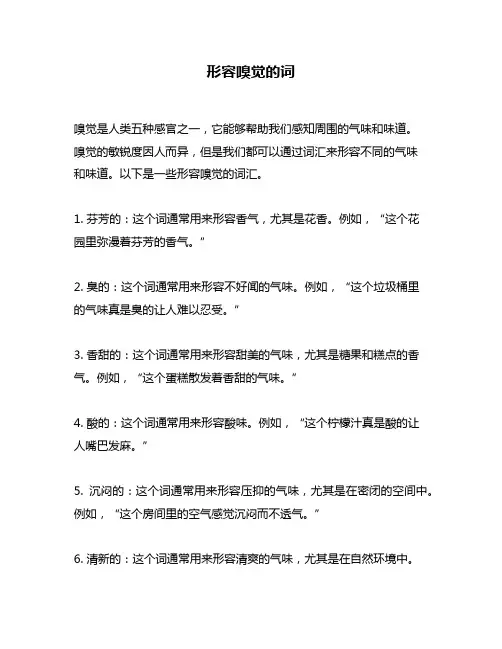
形容嗅觉的词嗅觉是人类五种感官之一,它能够帮助我们感知周围的气味和味道。
嗅觉的敏锐度因人而异,但是我们都可以通过词汇来形容不同的气味和味道。
以下是一些形容嗅觉的词汇。
1. 芬芳的:这个词通常用来形容香气,尤其是花香。
例如,“这个花园里弥漫着芬芳的香气。
”2. 臭的:这个词通常用来形容不好闻的气味。
例如,“这个垃圾桶里的气味真是臭的让人难以忍受。
”3. 香甜的:这个词通常用来形容甜美的气味,尤其是糖果和糕点的香气。
例如,“这个蛋糕散发着香甜的气味。
”4. 酸的:这个词通常用来形容酸味。
例如,“这个柠檬汁真是酸的让人嘴巴发麻。
”5. 沉闷的:这个词通常用来形容压抑的气味,尤其是在密闭的空间中。
例如,“这个房间里的空气感觉沉闷而不透气。
”6. 清新的:这个词通常用来形容清爽的气味,尤其是在自然环境中。
例如,“这个森林里的空气感觉清新而宜人。
”7. 辣的:这个词通常用来形容辛辣的气味,尤其是在辣椒和其他辛辣食品中。
例如,“这个菜肴真是辣的让人口齿生香。
”8. 浓郁的:这个词通常用来形容浓烈的气味,尤其是在香料和酒类中。
例如,“这个红酒散发着浓郁的香气。
”9. 恶臭的:这个词通常用来形容非常难闻的气味,尤其是在腐烂的物质中。
例如,“这个垃圾堆散发着恶臭的气味。
”10. 芳香的:这个词通常用来形容香气,尤其是花香和香料。
例如,“这个香水散发着芳香的气味。
”总之,形容嗅觉的词汇非常丰富,我们可以通过这些词汇来更好地描述周围的气味和味道。
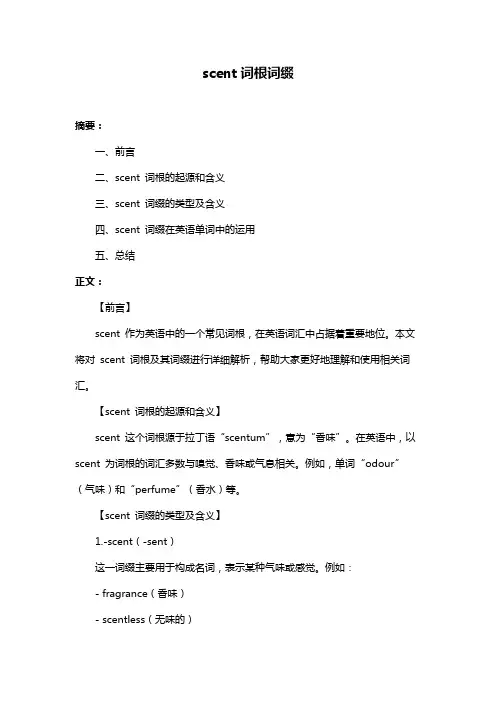
scent词根词缀
摘要:
一、前言
二、scent 词根的起源和含义
三、scent 词缀的类型及含义
四、scent 词缀在英语单词中的运用
五、总结
正文:
【前言】
scent 作为英语中的一个常见词根,在英语词汇中占据着重要地位。
本文将对scent 词根及其词缀进行详细解析,帮助大家更好地理解和使用相关词汇。
【scent 词根的起源和含义】
scent 这个词根源于拉丁语“scentum”,意为“香味”。
在英语中,以scent 为词根的词汇多数与嗅觉、香味或气息相关。
例如,单词“odour”(气味)和“perfume”(香水)等。
【scent 词缀的类型及含义】
1.-scent(-sent)
这一词缀主要用于构成名词,表示某种气味或感觉。
例如:
- fragrance(香味)
- scentless(无味的)
2.-scent(-sent)
这一词缀主要用于构成动词,表示“嗅觉”或“感知”。
例如:
- scent(嗅,寻找)
- resent(怨恨,憎恶)
【scent 词缀在英语单词中的运用】
1.名词
- 【例句】The flowers emit a pleasant scent.(这些花散发出宜人的香味。
)
2.动词
- 【例句】I can"t scent any danger.(我嗅不到任何危险。
)
【总结】
scent 词根及其词缀在英语中有着广泛的应用,掌握它们有助于我们更好地理解和记忆相关词汇。
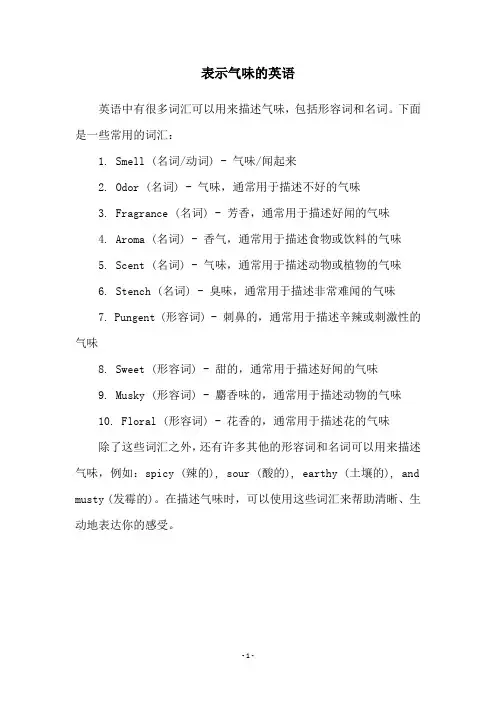
表示气味的英语
英语中有很多词汇可以用来描述气味,包括形容词和名词。
下面是一些常用的词汇:
1. Smell (名词/动词) - 气味/闻起来
2. Odor (名词) - 气味,通常用于描述不好的气味
3. Fragrance (名词) - 芳香,通常用于描述好闻的气味
4. Aroma (名词) - 香气,通常用于描述食物或饮料的气味
5. Scent (名词) - 气味,通常用于描述动物或植物的气味
6. Stench (名词) - 臭味,通常用于描述非常难闻的气味
7. Pungent (形容词) - 刺鼻的,通常用于描述辛辣或刺激性的气味
8. Sweet (形容词) - 甜的,通常用于描述好闻的气味
9. Musky (形容词) - 麝香味的,通常用于描述动物的气味
10. Floral (形容词) - 花香的,通常用于描述花的气味
除了这些词汇之外,还有许多其他的形容词和名词可以用来描述气味,例如:spicy (辣的), sour (酸的), earthy (土壤的), and musty (发霉的)。
在描述气味时,可以使用这些词汇来帮助清晰、生动地表达你的感受。
- 1 -。
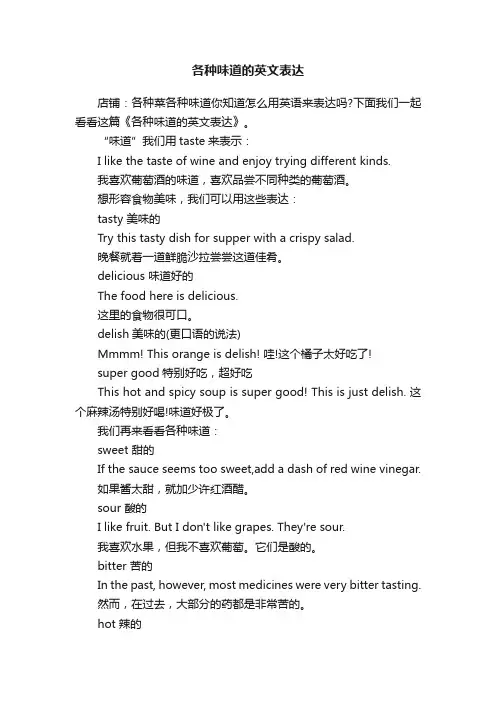
各种味道的英文表达店铺:各种菜各种味道你知道怎么用英语来表达吗?下面我们一起看看这篇《各种味道的英文表达》。
“味道”我们用taste来表示:I like the taste of wine and enjoy trying different kinds.我喜欢葡萄酒的味道,喜欢品尝不同种类的葡萄酒。
想形容食物美味,我们可以用这些表达:tasty 美味的Try this tasty dish for supper with a crispy salad.晚餐就着一道鲜脆沙拉尝尝这道佳肴。
delicious 味道好的The food here is delicious.这里的食物很可口。
delish美味的(更口语的说法)Mmmm! This orange is delish! 哇!这个橘子太好吃了!super good特别好吃,超好吃This hot and spicy soup is super good! This is just delish. 这个麻辣汤特别好喝!味道好极了。
我们再来看看各种味道:sweet 甜的If the sauce seems too sweet,add a dash of red wine vinegar.如果酱太甜,就加少许红酒醋。
sour 酸的I like fruit. But I don't like grapes. They're sour.我喜欢水果,但我不喜欢葡萄。
它们是酸的。
bitter 苦的In the past, however, most medicines were very bitter tasting.然而,在过去,大部分的药都是非常苦的。
hot 辣的hot curries辛辣的咖喱食品salty 咸的The meat is tender and tastes sweet outside and salty inside.让人感觉肉的口感是外表松脆香甜,里面略带咸味。
形容散发香味的动词
散发出香味的动词有很多,以下是一些常用的:
1. 发散(fā sàn):指气味从中心向四周散发,例如:“这个房间里的
花朵散发着迷人的香气。
”
2. 散发(sàn fā):泛指气味从物体表面向四周散发,例如:“这盘菜
散发出耳熟能详的酱香味。
”
3. 弥漫(mí màn):指气味在空气中弥漫开来,充满整个空间,例如:“酒香弥漫在餐厅里,让人垂涎欲滴。
”
4. 弥散(mí sàn):指气味在空气中慢慢散开,弥漫在空气中,例如:“欣赏完落日余晖后,夜空中散发着青草和花香的清新气息。
”
5. 飘散(piāo sàn):指气味从高处向下飘荡,例如:“山谷中飘散着
野花和松林的香味,远远望去很美。
”
6. 弥蒙(mí méng):指气味在空气中缭绕弥漫,形容气味浓郁,例如:“这个房间里的熏香一直弥蒙着,能让人感到放松和宁静。
”
除此之外,还有一些其他的动词可以用来形容气味香郁,如扑鼻、醉人、清新、清爽、清香等等。
这些动词可以根据不同的语境和气味来
选择使用,或者进行适当的组合,以便更好地传达你想要表达的意思。
总的来说,形容散发香味的动词有很多,选择哪种动词主要取决于具
体情景和个人喜好。
一个优美的描述需要恰当的用词,而选择合适的
动词能够使描述更加生动、具体、准确。
希望这些动词能够帮助你在
日常生活和写作中更好地表达气味的美好。
与香味有关的英语单词和例句(汇编)第一篇:与香味有关的英语单词和例句体验式英语教育先锋美联英语与香味有关的英语单词和例句1.aroma: refers to a strong, pervasive, pleasant odour, such as that given off by burnt good pipe tobacco, coffee, or appetizing food。
指一种强烈的、弥漫的香味,如烟叶、咖啡或美味食品的香味。
The aroma of fresh coffee permeated the air。
新鲜咖啡的香味弥漫在空气中。
2.scent: refers to an odour, natural or artificial, delicate and often pleasant。
指天然或人造的淡淡幽香There is a pleasing scent given off by a sachet hung in the room。
有一缕宜人的清香从悬挂在房间中的香袋散发出来。
3.perfume: refers to a sweet smell esp.from an essence of flowers。
指香味,尤指由花精中所散发的香味。
A faint perfume of jasmine came through the open window。
淡淡茉莉花香从敞开的窗口吹进来。
4.fragrance: refers to a sweet or pleasant smell, and stressesa delicate smell from plants。
指甜美的香味,特指植物的清新香味。
Do you remember the lingering fragrance of lilacs after a rain? 你可记得雨后丁香那缭绕的芳香? 5.bouquet:refers to a pleasingly sweet typical of a wine or liqueur。
scent的词源
摘要:
一、scent的词源背景
二、scent的词源分析
三、scent词源的意义及其在现实生活中的应用
四、总结
正文:
【一、scent的词源背景】
在我们日常生活中,香气四溢的气味总是让人心情愉悦,而单词"scent"就是用来形容这些气味的。
让我们一起来探寻一下"scent"这个词的词源背景。
【二、scent的词源分析】
"scent"这个词源于拉丁语词汇"sentire",意为"感觉"或"感知"。
在英语中,"scent"通常指人或动物通过嗅觉感知的气味。
有趣的是,"scent"这个词还有一个相关的形式,即"sent",它作为动词表示"闻到"或"察觉到"某种气味。
【三、scent词源的意义及其在现实生活中的应用】
从词源角度看,"scent"不仅代表着气味本身,还暗示了人类对气味的感知和识别。
在现实生活中,"scent"有着广泛的应用,例如在香水、化妆品、洗涤剂等领域。
此外,动物通过散发特定的气味来传递信息,这也是一种生物学的应用。
【四、总结】
"scent"这个词的词源背景和现实应用充分展示了人类对气味的感知和利
用。
从古至今,香气在人类社会中扮演着重要的角色,无论是在日常生活中还是在特殊的场合,香气都能给人带来愉悦的心情。
好听的英文单词在学习英语的过程中,我们不仅需要掌握单词的含义和用法,还需要了解一些好听的英文单词。
这些单词不仅在发音上有特点,而且在表达上也更具吸引力。
下面是一些好听的英文单词。
1. SerendipitySerendipity 是一个形容词,它表示一种意外的、偶然的发现或者是幸运的事情。
这个词给人一种积极向上和幸福的感觉。
当我们遇到一些意外的好事情时,我们可以用 Serendipity 来形容。
2. EffervescentEffervescent 是一个形容词,意思是兴奋的、活泼的、冒泡的。
这个词有很多积极的情绪要素,通常用来形容人或者事物的兴奋和精力充沛。
3. EuphoriaEuphoria 是一个名词,它表示一种极度的快乐和幸福的感觉。
当我们面临一些令人高兴和激动的事物时,我们常常会感到 Euphoria。
它有时也被用来形容一种暂时的精神状态,比如酒后的 Euphoria。
4. MellifluousMellifluous 是一个形容词,它表示声音柔和、优美或者悦耳动听。
常常用来形容人的声音或乐曲。
当我们听到一些动听美妙的声音时,我们可以用 Mellifluous 来形容。
5. BreathtakingBreathtaking 是一个形容词,它表示令人惊叹的或令人窒息的。
这个词常常用来形容美丽的景色或者令人惊叹的事物。
当我们看到一些壮丽的风景或经历一些令人难忘的时刻时,我们可以用 Breathtaking 来形容。
6. EnchantingEnchanting 是一个形容词,它表示迷人的、令人着迷的。
用来形容让人陶醉的、迷人的人或事物。
当我们看到一些令人陶醉的景色或者遇到一个迷人的人时,我们可以用Enchanting 来形容。
7. QuixoticQuixotic 是一个形容词,它表示不切实际、异想天开的。
这个词源自西班牙小说《堂吉诃德》,并常常用来形容那些追求理想但不切实际的人或事物。
英语里表达气味的词只有3个(总3页)--本页仅作为文档封面,使用时请直接删除即可----内页可以根据需求调整合适字体及大小--英语里表达气味的词只有3个用英语怎么描述气味?Describe a banana. It's yellow, perhaps with some green edges. When peeled, it has a smooth, soft, mushy texture. It tastes sweet, maybe a little creamy. And it smells like... well, it smells like a banana.描述下香蕉。
黄颜色,或许边缘带点儿绿。
剥开香蕉皮,光滑绵软、糊状质地。
味甜,口感细腻有点儿像奶油。
闻起来...嗯,香蕉味儿。
Every sense has its own “lexical field,” a vast palette of dedicated descriptive words for colors, sounds, tastes, and textures. But smell?每种感官都有其“词场”,有各色各样专门的词汇来描述颜色、声音、口味和质地。
但气味呢?In English, there are only three dedicated smell words—stinky, fragrant, and musty—and the first two are more about the smeller's subjective experience than about the smelly thing itself.英语中,只有三个专门描述气味的词——恶臭、芳香和霉味儿。
前两者更多是闻味者的主观体验,而非事物本身的气味。
Asifa Majid from Radboud University in the Netherlands has found that the Jahai people of Malaysia and the Maniq of Thailand use between 12 and 15 dedicated smell words.荷兰奈梅亨大学的阿西法·马吉德发现,马来西亚海族人(Jahai)和泰国曼尼科人(Maniq)运用12至15个专门描述气味的词语。
香味用英语怎么说你知道香味用英语怎么说吗?下面来学习一下吧。
香味的英语说法1:aroma香味的英语说法2:spiciness香味的英语说法3:Fragrance香味的相关短语:香味浓郁 fragrant flavour ; aromatic flavour ;桂香味 Cinnamon Flavor香味剂 odorant ; Flavouring ; Flavouring Additites香味料 spices增加香味 tart up香味油 fragrance oil香水香味 Perfume fragrance香味的英语例句:1. The savoury smell greeted them as they went through the door.他们进门时一阵香味扑鼻而来。
2. A tantalising aroma of roast beef fills the air.空气中充满诱人的烤牛肉香味。
3. The heady aroma of wood fires emanated from the stove.炉子里散发出木柴燃烧时的浓烈香味。
4. A smell of bread drifted from some distant bakery.一阵面包的香味从远处的面包房飘来。
5. She'd baked some bread which made the air smell sweet.她刚烤制了一些面包,空气里都弥漫着一股香味。
6. Scent your drawers and wardrobe with your favouritearomas.用你最喜欢的香味熏香你的抽屉和衣柜。
7. The smells of delicious foods floated all around him.美食的香味弥漫在他的四周。
8. Amy thought she caught the faintest drift of Isabel's flowery perfume.埃米觉得她闻到了伊莎贝尔身上飘出的一丝极微弱的花香味香水的味道。
英语里表达气味的词只有3个
用英语怎么描述气味?
Describe a banana. It's yellow, perhaps with some green edges. When peeled, it has a smooth, soft, mushy texture. It tastes sweet, maybe a little creamy. And it smells like... well, it smells like a banana.
描述下香蕉。
黄颜色,或许边缘带点儿绿。
剥开香蕉皮,光滑绵软、糊状质地。
味甜,口感细腻有点儿像奶油。
闻起来...嗯,香蕉味儿。
Every sense has its own “lexical field,”a vast palette of dedicated descriptive words for colors, sounds, tastes, and textures. But smell?
每种感官都有其“词场”,有各色各样专门的词汇来描述颜色、声音、口味和质地。
但气味呢?
In English, there are only three dedicated smell words—stinky, fragrant, and musty—and the first two are more about the smeller's subjective experience than about the smelly thing itself.
英语中,只有三个专门描述气味的词——恶臭、芳香和霉味儿。
前两者更多是闻味者的主观体验,而非事物本身的气味。
Asifa Majid from Radboud University in the Netherlands has found that the Jahai people of Malaysia and the Maniq of Thailand use between 12 and 15 dedicated smell words.
荷兰奈梅亨大学的阿西法·马吉德发现,马来西亚海族人(Jahai)和泰国曼尼科人(Maniq)运用12至15个专门描述气味的词语。
For example, ltpit describes the smell of a binturong or bearcat—a two-meter-long animal that looks like a shaggy, black-furred otter, and that famously smells of popcorn. But ltpit doesn't mean popcorn—it's not a source-based term. The same word is also used for soap, flowers, and the intense-smelling durian fruit, referring to some fragrant quality that Western noses can’t parse.
举个例子,ltpit 一词用来描述麝猫和熊狸这种长两米、毛发蓬乱、看上去像黑皮毛水獭的动物,因其气味像爆米花而闻名。
但ltpit 并不是爆米花的意思,这不是个基于来源的术语。
ltpit 还同样用以形容肥皂、花朵和气味浓重的榴莲,这都是些西方人鼻子无法辨识的气味芬芳。
Smell information translates straight into behavior or mood and evokes whole memories. Smell doesn't need language. Odors are expressible in language, as long as you speak the right language. It changes the way you perceive the world. Smell is an intrinsic part of Jahai culture in a way that it simply isn't in the west.
气味信息直接转化为行为和心情,并能唤起回忆。
气味无需语言,但可以用语言来表达,只要你说对语言,便能改变你看世界的目光。
气味是海族文化固有的内在,而西方人偏偏没有。